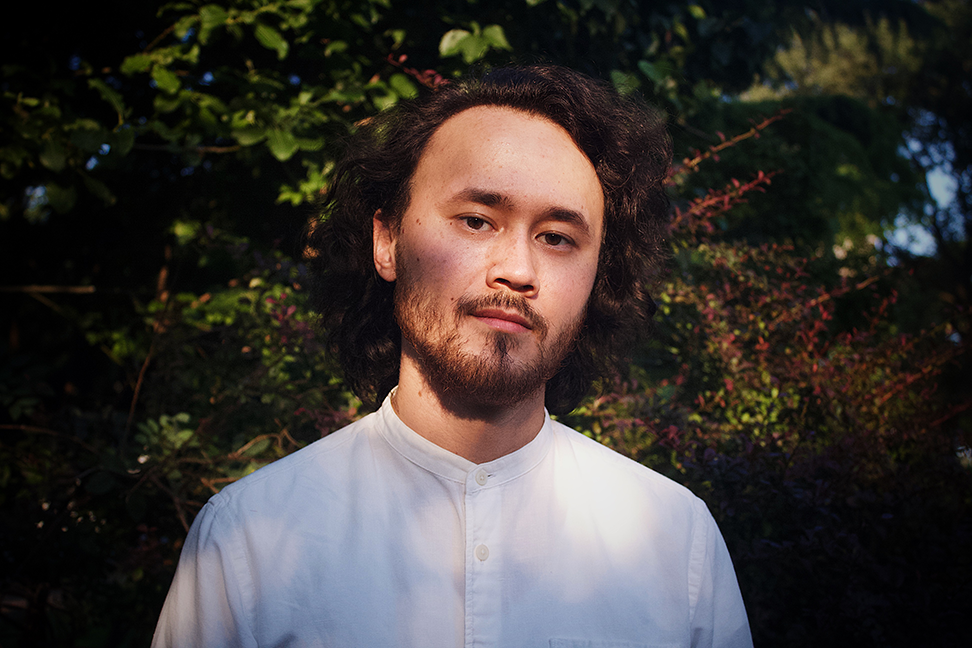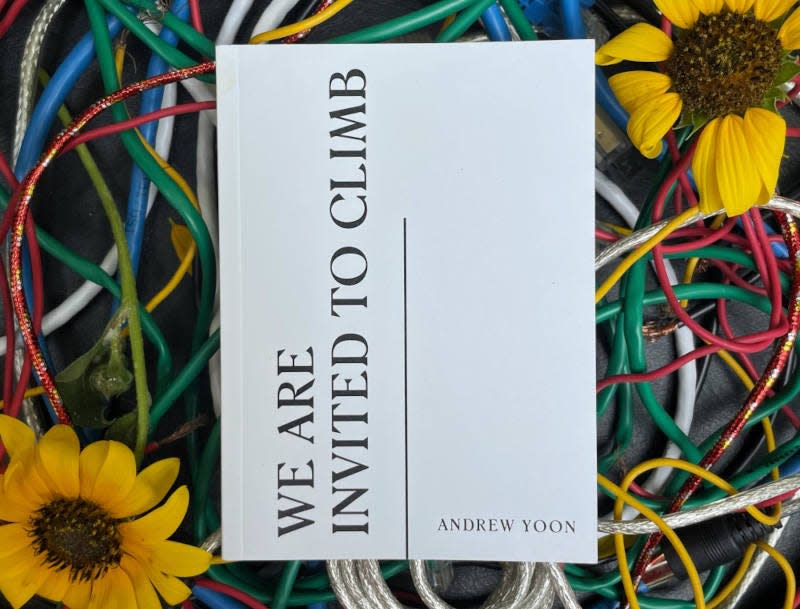Andrew Yoon brings the poetry of taking chances to Unbound Book Festival

Andrew Yoon daydreams of a not-so-distant future, and of a book club that would take up a title resembling his "We Are Invited to Climb," a work of "dynamic chance poetry."
"And they will all read different versions of the same book, and they will come together and they will talk about it," Yoon said. "In that room, when they’re discussing this blurry sort of book, they will conjure up another thing that doesn’t exist on any of the individual pages. That would be very exciting."
Set to appear at next week's Unbound Book Festival, Yoon wrote an unusual amount of possibilities into "We Are Invited to Climb." Both penned and coded through computer programming, these poems round available bends, adopting fresh meaning and altering the reader's experience.
The book can be handled as an object of physical media or accessed online through a "free live generating edition," in which a simple click refreshes the lines themselves.
More: Unbound can't-miss events, from Amazon to horror stories, sports writing to Kansas City lit
Measuring where music and poetry meet
Yoon often compares his present-tense work to past expectations of who he would be. He was "supposed to be a pianist," but for several years has created new music on the melodica, a handheld keyboard instrument that asks the artist to blow into a mouthpiece, initiating tone.
"Supposed to be a composer," Yoon's life bent toward poetry after studying true icon John Cage. Known to mainstream audiences for his ambient, ever-changing composition "4'33," Cage's 1961 book "Silence" spoke truth to Yoon — about Zen Buddhism, the creative life and, most importantly, the overlap between music and poetry.
Dipping a toe at a time into lyrical waters, Yoon noticed techniques and theories which serve both disciplines.
"If you chart the harmonic speed of a piece of music, you can draw out where the excitement curve is. And you can do the exact same thing in poetry," he said, through examining enjambments, turns of phrase and other poetic devices.
Thinking about what's the same about music and poetry is infinitely more fascinating than considering their differences, Yoon added.
Yoon extends an invitation to climb

Visit https://weareinvitedtoclimb.org/ on a Tuesday morning and you encounter "unique live-generated version 58081536338" of Yoon's book. A series of lower-case musings introduce the experience:
"These words change. the collection you’re reading is but one of countless possibilities left to chance, rendered anew when you loaded this page," Yoon writes. "while the contours within are composed with intention, wherever many ways to draw a line were found, those many ways were preserved."
They represent not only an invitation to climb but a sort of cultural olive branch and a soft call to breathe deep. Yoon writes:
"These words are made in earnest, with the sincere hope that they may bring you a small bit of peace. i thank you for being as you are and i wish you many quiet moments to come."
More: Plan to read these books from Unbound festival authors
The initial title poem beckons us to meet ourselves and to see which past and present versions of life and personhood we — and the world outside — contain. Click to affect the art, and the changes are both subtle and surely felt.
The poem's physical structure shifts, changing the experience of the eye as it relays meaning to the brain, then the heart. Measurements of time within the poem change, from days to months. As does the named anatomy of a plant. A valley becomes a mountain, and kite strings reach in opposite directions.
But the invitation to climb and the "strange compassion in the scale of it all" remains a steadfast source of light.
Chance poetry affects its maker similarly, in ways small but great. The work is a salve for Yoon's indecision, he joked — if five words might fit one space, he can enter them all as possibilities. "We Are Invited to Climb" also is a book-length address to concerns of creative ego and commodification.
Yoon's process helps "reduce the amount of me present in the work," he said. In doing so, it liberates the author from perfectionist tendencies — and from the very concept of the author itself.
"We have a lot of baggage, I think, from the 19th century of the genius artist that I think we’re still trying to shake off," he said. "To me, this is a really interesting way to go about challenging that. How can you even talk about a perfect work when the work is one of a googleplex?"
These poems read more like Yoon, he believes, and the process feels more properly weighted — "less life or death" — as he honors the plurality of choices that might suit a given piece of verse.
Writing chance and change into each poem also strips away our worst definitions of value — what the poem might be worth in dollars and cents — to emphasize our best. That is, what a poem means to the reader, how it works on and in them.
"I don’t think it completely defeats the demon," of commodification, "but it definitely poses some challenges to it," Yoon said.
Writing and reading are always processes of discovery, Yoon affirmed. A shift in sunlight or sitting in a different chair might affect the second reading of a given poem, let alone years' worth of emotions and fresh experiences. "We Are Invited to Climb" underlines that sensation, that a poem is forever changing "even if it doesn’t change," Yoon said.
And the writer's own sense of real-time revelation came home to him in exhilarating ways.
"Not only am I surprised where my fingers are taking me, but I’m also surprised where the text actually goes," Yoon said.
On AI, 'chance-lations' and what's next for Yoon
Yoon arrives at Unbound during a precarious moment for those who prize language. Some creators fear the use of artificial intelligence, or AI, in writing waters down a very significant slope.
Yoon shares their concerns, and is quick to illustrate the differences between AI and the processes behind "We Are Invited to Climb." AI is more of a "black-box" technology that cannot, by its nature, completely show its work, he said.
While his dynamic poems travel in unpredictable directions, Yoon remains the source of their theology and themes. At least at one point, he knew every word. His role as a creator is "building a tree of possibilities — and letting it zip through the tree in an unpredictable way," he said.
Fixing his gaze on the future, Yoon is interested in creating a "chance-lation" of the Tao Te Ching. The ancient Chinese text is notoriously difficult to translate, he said, written with vague grammatical principles that obscure the identification of subject and object.
Pulling together a number of existing translations, as well as his own ideas, could result in a sort of "meta-translation" and a deeper expression of his own ideals about the dynamic nature of art, Yoon said.
Yoon will read alongside Sun Yung Shin and Jennifer Maritza McCauley at 10 a.m. Saturday at Top Ten Wines; he will participate in the On a Cyborg Society panel with Alexander Weinstein and Akil Kumarasamy at 11:45 a.m. at Serendipity Salon. For more information on this year's Unbound, and a full author lineup, visit https://www.unboundbookfestival.com/.
Aarik Danielsen is the features and culture editor for the Tribune. Contact him at adanielsen@columbiatribune.com or by calling 573-815-1731. Find him on Twitter @aarikdanielsen.
This article originally appeared on Columbia Daily Tribune: Andrew Yoon brings the poetry of taking chances to Unbound fest

